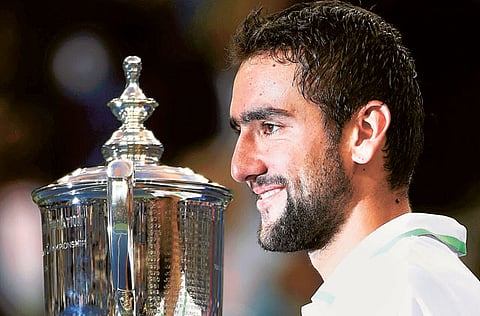Marin Cilic proud of ‘miracle’ US Open turnaround
Croatian, who was serving a doping ban 12 months ago, wins first Grand Slam title

New York: Marin Cilic hailed his maiden Grand Slam title at the US Open as a “miracle”, 12 months after the towering Croatian was forced to watch the tournament from home, seething over a controversial doping ban.
The 25-year-old Cilic eased past Japan’s Kei Nishikori 6-3, 6-3, 6-3 in his first major final after 27 previous Grand Slam appearances and wasted no time in summoning up the appropriate adjective.
“Considering everything, it’s a miracle,” he said.
Cilic tested positive for the stimulant nikethamide at the Munich Open in May last year. He always protested his innocence, claiming the substance was contained in an over-the-counter product bought on his behalf.
Although his ban was cut from nine months to four, he was still unable to play the 2013 US Open.
But, despite his resentment at the manner in which the case was handled, Cilic believes that his time away from the sport helped harden his talents, paving the way for his Grand Slam breakthrough on Monday.
“I felt the first part that helped me was the mental toughness, being much stronger and I was much tougher with myself on the tennis court when I was practicing and also when I was playing matches,” he said.
“The other part was enjoying myself much more on the court. I was always looking for the result. So things changed around and flipped it over with trying to enjoy on the court and enjoy every moment, which helped me to be much more relaxed.”
Cilic sat at home in Monte Carlo this time last year, watching the action from Flushing Meadows on TV but never daring to dream that 12 months later he would be succeeding Rafael Nadal as champion.
“I watched a lot of the matches. Of course you want to watch the guys and maybe you’re gonna catch a few tactical things you see. I felt that Rafa was playing amazing tennis against Novak and it was a really good tournament,” he recalled.
“I was involved in tennis because I was training every day either physically or tennis, and I didn’t let my mind go away because I was hoping to return any day. I was hoping just to come back on the tour and that would be the biggest joy in my life.”
Cilic came a long way at the 2014 US Open.
In the early rounds — and with no Croatian press on site — he was not in demand for interviews, going about his business on the quieter, outside courts.
But steadily he made his move, seeing off Czech sixth seed Tomas Berdych in the quarter-finals and 17-time major winner Roger Federer in the semi-finals.
Both those wins, like the final, were in straight sets.
In his corner, chewing his nails and living every shot and all the 98 aces he sent crashing down, was coach Goran Ivanisevic, the last Croatian man to win a major at Wimbledon in 2001. That win, too, came on a Monday.
“Goran is a great guy. He has a huge heart,” said the new champion, although his compatriot’s superstitious nature remains even if it does not extend to watching children’s television, a famous legacy of Ivanisevic’s Wimbledon triumph.
“Every second day is the same day for all of us — my fitness trainer, physio and Goran would have a coffee, have breakfast at the same place. I would stay back at our place, have breakfast on my own,” said Cilic.
“Many different things. Not shaving. Goran not shaving himself. Yeah, it was just Goran going through his Wimbledon moments again — we didn’t watch Teletubbies, though.”
Cilic said he would split his $3 million prize money with his team, which could be useful as Ivanisevic jokingly suggested that he may quit at the top as a coach, a job he has only held since October last year.
“It was fantastic to see your player win a Grand Slam tournament. Now I may retire,” he said.
“I told him to get pleasure out of playing and he did it in front of 20,000 people. Today he played like he had already played 20 Grand Slam finals.”
Sign up for the Daily Briefing
Get the latest news and updates straight to your inbox



